The merger of Dawn Meats and Dunbia has created the second largest red meat group in the industry, behind ABP. So what’s driven the deal, and how will it affect the market?
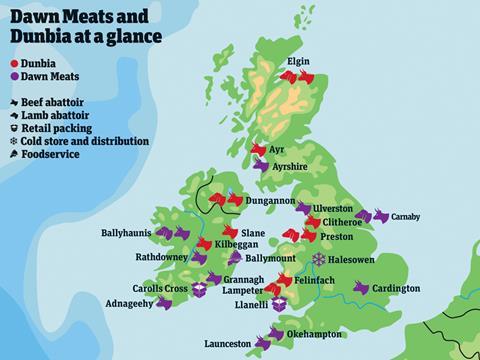
First, what does the deal involve?
The Irish and Northern Irish processors have agreed a strategic partnership to establish a joint venture of their UK operations. Dawn Meats will hold the majority stake, but it is unclear what percentage above 50% the groups have agreed. Dunbia CEO Jim Dobson will take the helm of the new group, which will be run from the Northern Irish group’s Dungannon hq, with Dawn Meats CEO Niall Browne acting as executive chairman. Dawn will separately acquire Dunbia’s operations in the Republic, made up of an abattoir in Slane and a boning hall in Kilbeggan.
What’s the rationale?
The influence of Brexit is undeniable (see box, below). Though the UK’s exit from the EU is unlikely to have been the initial motivator for talks, the prospect of a hard border between the Republic and the rest of the UK will certainly have injected urgency into proceedings. But while the prospects of costly tariffs and the myriad other uncertainties in the UK’s divorce from Europe will have weighed heavy, it is by no means the whole story.
Increased size and bargaining power - along with Dunbia’s close relationship with Sainsbury’s, Asda, the Co-op and Iceland - will put Dawn on more of an equal footing with bigger rival ABP when it comes to retail negotiations. Plus, it gives Dawn access to Dunbia’s sheepmeat processing facility in Wales, one of the biggest in Europe, providing the Irish business a host of new options when it comes to lamb.
Dawn’s business has focused more on value-added meat - ready-to-cook and sous vide - over the past few years. “Dunbia will add another avenue for that side of the business and provides a cheaper source of supply, which could help bolster slender margins in the red meat market” adds a senior meat industry source.
Can we expect sites to close as a result of the deal?
A City source says Dawn will have one eye on synergies that can be squeezed out of Dunbia to make it a leaner operator, with all UK sites likely to come under fierce scrutiny. “Dawn has the balance sheet to be able to afford to rationalise the facilities, some of which are under scale, with not enough volume going through them,” he adds.
“There is potential for lots of options - one site could be dedicated purely to value-added for example.” However, another source argues the Dawn and Dunbia sites are “highly complementary” with very limited overlap: “The combination is a good strategic fit that could lead to operations growing in the UK and Ireland.”
Is this just a prelude to a full Dawn takeover or are the Dobsons in it for the long term?
Dawn Meats is a 49% shareholder in Elivia, the number two beef processor in France, following a 2015 deal. The Elivia agreement includes an option for Dawn to increase its stake to 70% by 2019, leading industry sources to speculate a full takeover of Dunbia along similar lines may at some point be on the cards. However, Dunbia has stressed the long-term nature of the partnership. Jim Dobson says: “This joint venture is a long-term deal, which will bring many opportunities for growth and expansion. We are fully committed to taking the business to the next level.” As well as founders Jim and Jack Dobson, there are younger Dobson family members in the business, primed to take over when the older generation retire.
Dawn Meats
Founded: 1980
Revenue: €1.2bn (£1bn)
Headquarters: Grannagh, Waterford, Republic of Ireland
Processing capacity: 500k cattle and 800k lamb
Staff numbers: 3,300
Key customers: McDonald’s, Tesco, M&S, Lidl and Aldi
Dunbia
Founded: 1976
Headquartera: Dungannon, Northern Ireland
Revenue: £800m (€920.9m)
Processing capacity: 400k cattle and 1.6 million sheep
Staff numbers: 4,000
Key customers: Asda, Sainsbury’s, Co-op and Iceland
What does the deal mean for 2 Sisters and ABP?
As revealed by The Grocer in 2016, Dunbia was engaged in exclusive talks with 2 Sisters over a £1.3bn merger of the red meat businesses of both processors. However, the deal never made it over the line. The new jv will inevitably give 2 Sisters owner Ranjit Singh pause for thought as it creates a stronger red meat operator, with Dawn beefing up Dunbia’s firepower, a City source says. However, Singh will be more worried about ABP, which remains the dominant player. ABP revenues of almost €3bn (£2.6bn) outweigh a combined total of about £1.8bn (€2.1bn) for Dawn and Dunbia. The market leader also controls more than 30% of the UK supermarket business, with Dawn and Dunbia closer to 20%, sources add. “The deal will allow Dawn to compete with ABP better when a retailer goes out for contract, but ABP is still in a stronger position as bigger scale usually means cheaper prices,” says one.
What are the implications for retailers and consumers?
With the uncertainty of Brexit hanging over the sector, a UK presence for Irish supplier Dawn will undoubtedly give the multiples confidence in future supply. Economies of scale delivered by another meat behemoth also hand the supermarkets opportunities to buy at lower prices as they continue to fight a war against the discounters, suggests one source. This, in theory, should translate to lower prices in the meat aisles but will depend on whether retailers decide to pass savings on to shoppers or deploy the extra resources elsewhere.
How about farmers?
Farmers are likely to be less happy about power aggregating into fewer hands, with worries that consolidation in the sector will lead to lower farmgate prices and apply more pressure to already squeezed margins. Irish farmers may have more to fear as the merger means more than half of the national cattle kill in the Republic is now controlled by ABP and Dawn.
Irish Farmers’ Association president Joe Healy says farmers are always concerned about the concentration of ownership in the beef processing sector because of the lack of competition, as evidenced in an independent competition report commissioned by IFA in July 2016. He adds the major concern for farmers is that they get a fair and viable price return from the market.
Will the deal trigger more consolidation in UK and Irish meat?
A senior dealmaker argues there is scope for further consolidation in the UK, with Brazilian and German processors eyeing investment in protein facilities and ABP likely wanting more presence on this side of the border. Privately owned businesses such as Randall Parker and Waitrose supplier Dovecote Park have well-run operations and could prove attractive targets, he says. “There is a massive Brexit brick wall coming and the industry is very mindful of that fact,” the City source adds. “There are no guarantees that a UK base makes life any easier, particularly with regard to retaining migrant workers and getting around tariffs, so it’s not all plain sailing, but it does at least give you a foot on the inside.”
British Meat Processors Association CEO Nick Allen adds that consolidation helps to strengthen the UK industry: “If we’re going to compete in the modern world outside Europe, the closer we move to more integrated supply chains the more efficient we are likely to be and therefore the more competitive we are likely to be.”
What will competition authorities make of the deal?
It is always hard to judge what the Competition and Markets Authority might make of a given deal - and the merger also needs clearance from the Competition and Consumer Protection Commission in Ireland. However, there is plenty of competition in red meat in the UK - from the likes of ABP, 2 Sisters, Hilton, Randall Parker, Scotbeef and Morrison-owned Woodheads - so consumers and retailers are unlikely to suffer from reduced competition as a result of the deal.
Why is Brexit so important?
The importance for Dawn in securing access to the crucial British market for its Irish meat cannot be overstated. “It’s a very good deal for Dawn as it gives the business every chance of better market access post Brexit,” says a dealmaker.
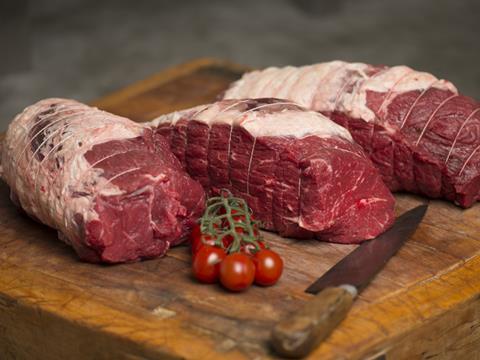
The huge volumes of meat traded between the UK and the Republic present a major worry for suppliers both sides of the border, with Irish exports already made less competitive by the weakness of sterling. The UK takes over 50% of Ireland’s beef annually, worth €1.1bn in 2016 [Bord Bia]. Ireland has always been the dominant supplier of UK beef, accounting for 70% of the 250,000 tonnes imported annually.
If Britain fails to negotiate a trade deal, WTO tariffs of 50%-65% on red meat could be applied. Bord Bia CEO Tara McCarthy tells The Grocer this week in a Big Interview that this could “devastate” the sector. Bord Bia and AHDB agree tariffs will lead to higher prices and significantly shorten supplies to the UK. “Irish suppliers’ biggest worry post Brexit is losing supply access to Britain, and Dawn will see the Dunbia tie-up as a potential way round any tariffs,” a meat expert says.
The boss of an Irish food group adds: “Dawn and Dunbia will be looking to take as much share of the UK supply side as possible to ensure they can supply key customers in the event Irish product currently coming in becomes uncompetitive due to tariffs.”







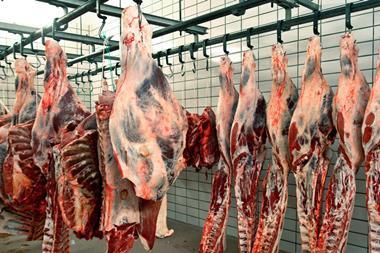
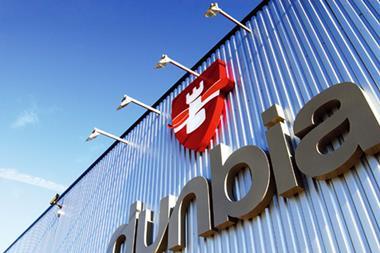
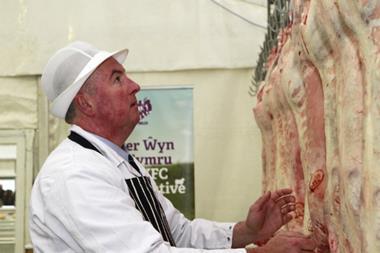
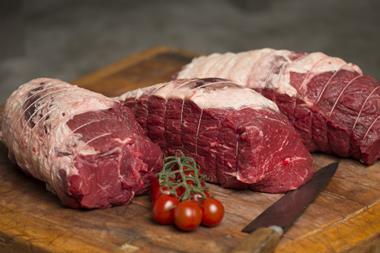
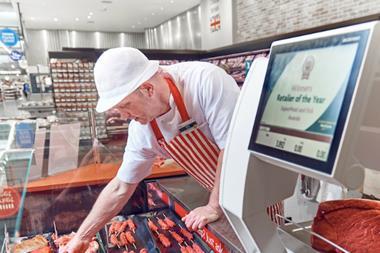







No comments yet